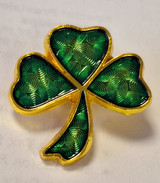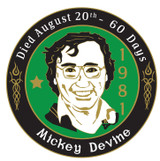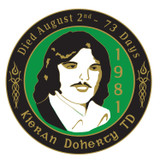
Kieran Doherty Badge
Died August 2nd, 1981
A dedicated republican and an outstanding soldier
When the family, friends and former comrades of Belfast IRA Volunteer twenty-five-year-old Kieran Doherty learnt that he was joining the H-Block hunger strike, as a replacement for Raymond McCreesh, it came as no surprise to them.
Although Kieran had spent seven of the last ten years imprisoned, his complete selflessness and his relentless dedication to the liberation struggle left no-one in any doubt that Kieran would volunteer for this terrible and lonely confrontation with British rule inside the H-Blocks of Long Kesh. Last December he was amongst those thirty prisoners who were on hunger strike for four days prior to the ending of the original seven-strong strike.
Kieran was born on October 16th, 1955 in Andersonstown, the third son in a family of six children. His two elder brothers, Michael, aged 28, and Terence, aged 27, were interned between 1972 and 1974.
Kieran has two younger sisters, Roisin and Mairead; and his younger brother, Brendan, aged twelve, is still at school.
BACKGROUND
Kieran’s mother, Margaret, is a Catholic convert from a Protestant background. His father, Alfie Doherty, who is a floor-tiler by trade, is a well-known figure in Andersonstown.
Kieran’s paternal grandfather comes from Limavady, County Derry, and after his people moved to a house in North Belfast in the ‘twenties, they were threatened that the house was going to be burnt.
This was during the loyalist-initiated pogroms which followed partition.
They had to flee to West Belfast enacting a tragedy which was to repeat itself in front of Kieran’s eyes in the early seventies, and stir him to take action.
Alfie’s uncle, Ned Maguire, took part in the famous IRA roof-top escape from Belfast’s Crumlin Road jail on January 15th, 1943.
Ned Maguire’s son, also called Ned, and a second cousin of Kieran, was an internee in Cage S of Long Kesh in 1974, when he took part in the mass escape from the camp during which Hugh Coney was shot dead by the British army. Young Ned Maguire was one of the three who managed to reach Twinbrook before being recaptured. He is now on the blanket.
Ned’s sisters (and Kieran’s second cousins), Dorothy Maguire, aged 19, and Maura Meehan, aged 30, were shot dead by the British army on October 23rd, 1971, in a car in the Lower Falls area of Belfast. Both were members of Cumann na mBan.
Another relative of Kieran’s, his uncle, Gerry Fox, was part of the famous Crumlin Road jail ‘football team’, who escaped from the jail by climbing over the wall in 1972.
CHILDHOOD
However, Kieran’s childhood was relatively ordinary. He loved sport more than anything else, and was always out playing Gaelic football, hurling or soccer.
Kieran went to St. Theresa’s primary school, then moved to the Christian Brothers secondary school on the Glen Road, where he studied until the age of sixteen.
A keen Gaelic footballer, he won an Antrim Minor medal in 1971 for St. Theresa’s GAC.
Kieran took up cycling for a while, following his brother, Michael, in St. Thomas’ cycling club. His mother recalls him taking part in a race with a faulty bicycle: “Although the chain came off at least twenty times through the race, he was so stubborn that he finished with a bronze medal.”
St. Thomas’ cycling club was later decimated by internment. Kieran, his brothers, and many other Andersonstown boys were to end up behind the wire. To such an extent, that Kieran s young brother, Brendan, asked his mother one day in 1975 when it would be his turn to go where all the ‘big boys’ were kept. Brendan was then six.
In the summer of 1971, Kieran got a job as an apprentice in heating engineering but was laid-off when the firm closed down a few months later. He worked for a while at floor-tiling with his father.
JOINED
In the meantime, however, internment had burst open the lives of many Andersonstown families. Kieran had never been interested in politics until then: nor had his family ever discussed the political situation in front of him.
Like hundreds of other boys and girls of his age, he was moved by the sight of uprooted families leaving a home in cinders behind them. As all of the evacuees were being catered for in local schools, Kieran and his brothers begged their parents to allow them to go and help. Kieran saw the British army on the streets, his friends and their families harassed. He joined na Fianna Eireann in the autumn of ’71.
Kieran proved himself to be an outstanding member of the Fianna. Reliable, quick on the job, he was obviously giving the best of himself to every task assigned him with the aim of being noticed and recruited for the IRA as quickly as was possible.
Even at this early stage of his involvement, he is remembered for his initiative and his discreet ways. Unlike some boys of his age, he never boasted about his activities.
But the British army soon noticed him too and Kieran, his family, and his home, became a target for frequent British army harassment.
On October 6th, 1972, the British army came to arrest Kieran, despite his father’s objection that Kieran was under seventeen. The Brits had checked up, they said, and after a heavy house raid they took Kieran away in the middle of the night. His father got him released eventually after waking up the sexton of St. Agnes’ chapel and obtaining Kieran’s birth certificate.
The Brits were ten days too early.
True to form, on October 16th, the British army were back in force and swamped Kieran’s district, waiting for his return from work. But relatives managed to warn him and he was driven over the border to an uncle in Limerick.
He did not much enjoy his enforced exile and, bursting to get back into action, he made his way back to Belfast at the beginning of ’73.
INTERNED
A week or so later, he was arrested, taken to Castlereagh, and then interned in Long Kesh where he spent over two years from February ’73 to November ’75. He was among the last internees released.
Always even-tempered and quiet-spoken he used his time developing his military skills.
In a letter to his mother he wrote: “They might intern all of us, but we will come out fighting.”
He made a lot of handicrafts during his two-and-a-half years in captivity.
His parents’ home displays a lot of his work, in particular a hand-carved wooden plaque commemorating Dorothy Maguire and Maura Meehan.
On the eve of his birthday in October ’74, Long Kesh prison camp was burned. When visits were eventually resumed he did not complain to his parents of brutality but just remarked jokingly on the ‘birthday party’ he had been given.
He was released from Long Kesh in November ’75, as undaunted as he sounded in his letters, and reported back to the IRA immediately. Always eager to operate, he was included in a team of Volunteers from around Rossnareen which gave the British army in Andersonstown many sleepless nights until a wave of arrests in the summer of ’76.
As the IRA/British army truce petered out at the beginning of ’76, ‘Big Doc’, as he was known by all, soon had to move out of his parents’ house. Raids were a fortnightly occurrence, at least, with furniture wrecked and floorboards lifted.
Mrs. Doherty was tidying up a first-floor bedroom after such a raid when she fell through the carpet, the floor, and partly through the sitting-room ceiling. The Brits had omitted to replace the floorboards. The scar on the ceiling can still be seen.
Many friends who met Kieran after his internment period found him extremely mature for a lad of twenty, not boisterous like most people of his age. He obviously, by then, had thought things out, made a definite choice, and assessed the dangers.
As an operator he was a perfectionist and his comrades recall feeling extremely safe with him. Even in the eventuality of things going wrong they knew Kieran would not give anything away.
ESCAPES
He had many narrow escapes.
One night, as he was shifting ‘gear’ in Andersonstown, he was chased up and down the side streets for over five minutes by two Brit landrovers.
Another time, as he was driving to a night job as security man for a firm, armed, as he often was, he drove into a British army road block.
He calmly took his tie out of his pocket, put it on, tidied himself up, and, winding down the window, shouted: “What’s up lads? Let me through, please, I’m going to my work, over there, security staff.”
And the British soldiers opened the way for him. ‘Big Doc’ was welcome in many Andersonstown homes and highly respected by all who knew him.
Families with whom he billeted remember how security conscious he was, staying away for days, using billets in no regular pattern.
ENJOYED
Through those months of intense involvement Kieran had little chance to unwind. He mostly liked to go to local clubs for a quiet pint with a few friends.
He also had a reputation as a practical joker. One day he rang a friend from a pub and told him they were wrecking the place, simply to have his friend rush over in his car to pick him up.
In July ’76, a few weeks before his arrest, Kieran enjoyed one of the rare holidays he ever had since the arrival of British troops on his local streets. With a few close friends he drove to the South and was able to indulge in his love for outdoor activities, exhausting his friends with long walks and swims.
By that time he had met his girlfriend, Geraldine, the only steady relationship he ever formed during his short period of freedom.
They did not get much of a chance, as Kieran’s heavy republican involvement often interfered with their dating and since August ’76 they only met for a few minutes once in a while under the gaze of prison warders.
SEAN McDERMOTT
Kieran’s comrades-in-arms recall one particular operation, of the many he was involved in, when one Andersonstown Volunteer – Sean McDermott – was shot dead.
Kieran got away and was told to lie low for a few days, but nevertheless he appeared at his comrade’s funeral.
Sean McDermott’s mother has a photograph of the funeral cortege in which Kieran can be seen, standing on the footpath, sombre, alone, looking on as the coffin is carried to Milltown cemetery.
Sean’s death, and the arrest of other comrades involved, hit Kieran very hard.
BOMBING
In August ’76, as Kieran and his unit were on a bombing mission, the van in which they were travelling was chased by the RUC near Balmoral Avenue in Belfast.
Kieran got out of the van and commandeered a car, which he left some streets away and walked off.
Meanwhile, the others in the van were cornered, Liam White being captured immediately, and the others, Chris Moran, Terry Kirby and John ‘Pickles’ Pickering – himself later to embark on hunger-strike – finally giving themselves up when surrounded in a house they had taken over.
The RUC picked Kieran up one-and-a-half miles away from the scene, unarmed.
He was later charged with possession of firearms and explosives and commandeering the car. Forensic tests could not link Kieran to the first two charges, and although it was impossible for the RUC to have spotted him escaping, seventeen months later, at his trial, RUC Constable Bryons perjured himself twice in order to see Kieran locked up.
On remand in Crumlin Road jail he met Francis Hughes and developed a great admiration for him. Friends often speak of the similarities between the two, always defiant, always fighting, born free.
In Crumlin Road, Kieran was often ‘on the boards’ as punishment for his refusal to acknowledge the warders in any way. He carried this attitude into the H-Blocks after he was sentenced, in January 1978, to eighteen years imprisonment for possession, and four years for commandeering the car.
BLANKET
Kieran joined the blanket protest immediately as did his comrades sentenced with him. He spent all but two weeks of his three years and almost eight months in the H-Blocks, in H4-Block (the temporary spell was in H6), before being moved to the prison hospital during his hunger strike.
Recollections of Kieran’s experiences in the H-Blocks give an impression of relentless conflict between himself and the warders, who made him a target both because of his height and because of his stubborn defiance of the prison regime.
On ‘appeal’ visits he always had to be dragged away, ignoring all calls to end the visit. He never looked a warder in the face when one addressed him and never replied to their orders. He always refused to submit to the anal searches over the mirror before and after visits and was beaten for this.
The worst incident occurred in July ’78 when Kieran refused a mirror search before a legal visit. Eight warders jumped on him, one squeezing his testicles until he became unconscious. He received blows to every part of his body and was taken to the prison hospital.
Although people who visited him recall how often he arrived pale or with grazes on his arms or bloodshot eyes, he never complained, brushing their questions off with a shrug: “I’m OK. What’s the sceal?”
CHESS
Although Kieran had not been taught Irish at school, and had no time to learn it, later he became a fluent speaker in the H-Blocks like hundreds of his imprisoned comrades.
Another skill mastered by Kieran, whilst in the H-Blocks, was playing chess – crude chess men were made from scraps of paper and the game was played on a mock board scratched out on the cell floors.
Displayed proudly in his parents’ sitting room is an engraved plaque bearing a stunning yet heartbreaking story in eight words: ‘Kieran Doherty, 1980 Champion, Ciaran Nugent Chess Shield’.
And, next to it, another shield, again engraved ‘Ciaran Nugent Chess Shield’, but this time with twelve metal tags, the top of which bears Kieran Doherty’s name and ‘1980’, the other eleven still blank. A clue to Kieran’s patience and ability, a clue to the blanket men’s grim determination to outlast the H-Blocks.
CAVAN/MONAGHAN
In June of this year, in the Free State general election, Kieran was elected a member of the Leinster House parliament for the Cavan/Monaghan constituency with 9,121 first preference votes – only 303 votes behind the then-sitting Free State Minister of Education.
HUNGER STRIKE
To a friend who visited him after the first hunger strike, which ended last December, Kieran said: “They (the warders) are really rubbing our noses in it. By God, they will not rub mine!”
Asked whether he would not settle down – after all, with five years done and remission, another six years would soon be over. He replied: “Remission has nothing to do with it. There is much more than that involved.”
So he went on hunger strike on Friday, May 22nd, having put his name forward for it long ago, as undaunted and full of fighting spirit as when he roamed free on the streets of Andersonstown.
A child, like hundreds of others a product of British brutality and stupidity in the North, who revealed himself to be an outstanding soldier of the republic.
Kieran was a shy, reserved, easily-embarrassed young man who was single-minded and determined enough to have become, in himself, a condensed history of the liberation of a people.
- Shipping:
- Calculated at Checkout
Related Products


Shamrock Badge

IRB Badge

Mickey Devine Badge

Armagh Goal Badge

Fianna Éireann Badge

Kevin Lynch Badge
- Shop
- An Phoblacht
- Badges/Pins
- Beanies/Hats/Caps
- Bobby Sands/Hunger Strikers
- Books/Calendars
-
CD/DVD
- CD/DVD
- All CD/DVD
- DVD's
-
Christmas Stuff
- Christmas Stuff
- All Christmas Stuff
- Christmas Card
- Easter/Lilies
- FLAGS
- FRIDGE MAGNETS/STICKERS
- Historical photographs
- Jackets
- Jerseys
- Jewellery/Coins
- Leather Craft
- Martin McGuinness
- MUGS
- Palestine
- Postcards
- Prints/Posters/Postcards
- SALE
- T-Shirts



